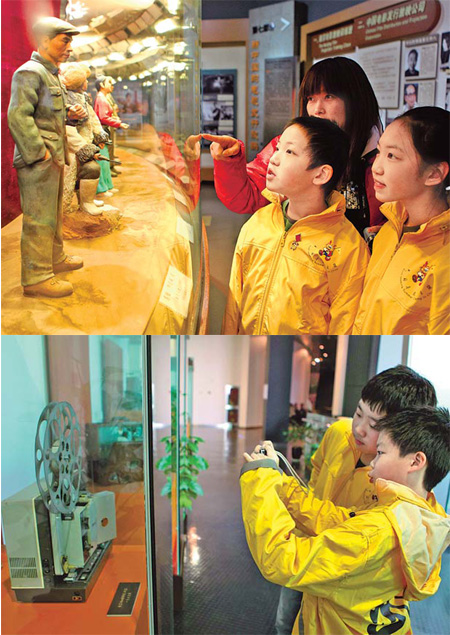Education
US kids follow their roots to Beijing
By Wang Wei (China Daily)
Updated: 2010-12-28 08:08
 |
Large Medium Small |
|
Top: Melissa Wen (right) and her brother Matthew are shown around the China National Film Museum. Above: Brothers Andy (back) and Anthony Zhou take a photo of some vintage recording equipment at the museum. [Photos/ China Daily] |
This was Melissa Wen's first Christmas outside of the United States and though there were no Christmas trees, Santa Claus appearances or exchanges of gifts, she said it was the best ever.
On Christmas day, the 12-year-old American-born Chinese visited the Bird's Nest and the Water Cube - the national stadium and the aquatics center for the 2008 Beijing Olympic Games. In the evening she saw a kungfu show and played cards with Chinese friends.
"It was a wonderful day," she said. "I had so much fun."
Wen is one of four Chinese-American teenagers who took part in a "Chinese origin root search trip", organized by the Beijing Overseas Chinese Affairs Office in partner with the Association of Chinese Scientists and Engineers USA.
In addition to visiting world-renowned scenic spots like the Great Wall and the Forbidden City, the weeklong trip - which started on Dec 23 - will take the Chicago-based group to discover the ancient history of the capital.
They will visit hutong (traditional alleyways), make Peking Opera masks and Chinese knots - a handicraft for home decoration.
They will also attend classes with students at Beijing Huiwen Middle School, to allow them to see what school is like in China and to offer a chance to begin lifelong friendships with their Chinese counterparts.
Chu Shimin, director of the culture and liaison department of the office, said they are covering all expenses incurred in Beijing, including accommodation, food and transport. Parents only need to pay for the air tickets.
Guangdong and Fujian provinces are usually the most popular destinations for Chinese living overseas who are looking to discover their roots, said Chu. She said Beijing began organizing its own "Chinese origin root search trip" eight years ago.
On average, 200 foreign-born Chinese teenagers come to the capital every year, mostly to attend summer camps. This figure is increasing in recent years because many Chinese have migrated overseas after receiving science degrees in Beijing - considered a high-tech center by the office - and they want their children to see what they experienced.
Chu said her office is expecting at least 300 young foreign-born Chinese to come to Beijing on courses planned for next year.
"The children of Chinese who have migrated overseas are mostly unable to speak good Chinese or write many Chinese characters," Chu said. "And the third generation often doesn't feel any connection to China."
She said helping them get a glimpse of their family's origin is very important.
For Fan Binjiang, the mother of two children on the trip, she said she hopes they spark an interest in Chinese culture that can be taken back to the US.
Fan said her two sons were not very motivated in their weekly four-hour Chinese lessons. She believes they might change their minds after the trip to China.
"They were not big fans of eating Chinese food but they really like the food here and think kungfu is very cool," she said. "I hope they will have more affection toward China after the trip."
